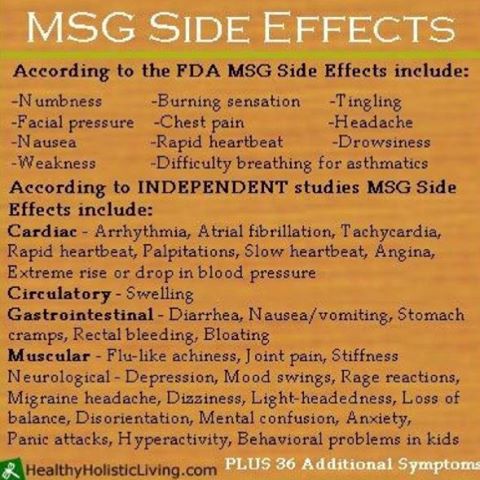|
|
|
|
Read full article here:http://articles.mercola.com/sites/articles/archive/2009/04/21/msg-is-this-silent-killer-lurking-in-your-kitchen-cabinets.aspx
"One of the best overviews of the very real dangers of MSG comes from Dr. Russell Blaylock, a board-certified neurosurgeon and author of “Excitotoxins: The Taste that Kills.” In it he explains that MSG is an excitotoxin, which means it overexcites your cells to the point of damage or death, causing brain damage to varying degrees -- and potentially even triggering or worsening learning disabilities, Alzheimer’s disease, Parkinson’s disease, Lou Gehrig’s disease and more. Part of the problem also is that free glutamic acid is the same neurotransmitter that your brain, nervous system, eyes, pancreas and other organs use to initiate certain processes in your body.4 Even the FDA states: “Studies have shown that the body uses glutamate, an amino acid, as a nerve impulse transmitter in the brain and that there are glutamate-responsive tissues in other parts of the body, as well. Abnormal function of glutamate receptors has been linked with certain neurological diseases, such as Alzheimer's disease and Huntington's chorea. Injections of glutamate in laboratory animals have resulted in damage to nerve cells in the brain.”5 Although the FDA continues to claim that consuming MSG in food does not cause these ill effects, many other experts say otherwise. According to Dr. Blaylock, numerous glutamate receptors have been found both within your heart's electrical conduction system and the heart muscle itself. This can be damaging to your heart, and may even explain the sudden deaths sometimes seen among young athletes. He says: “When an excess of food-borne excitotoxins, such as MSG, hydrolyzed protein soy protein isolate and concentrate, natural flavoring, sodium caseinate and aspartate from aspartame, are consumed, these glutamate receptors are over-stimulated, producing cardiac arrhythmias. When magnesium stores are low, as we see in athletes, the glutamate receptors are so sensitive that even low levels of these excitotoxins can result in cardiac arrhythmias and death.” 6 Many other adverse effects have also been linked to regular consumption of MSG, including: Obesity Eye damage Headaches Fatigue and disorientation Depression Further, even the FDA admits that “short-term reactions” known as MSG Symptom Complex can occur in certain groups of people, namely those who have eaten “large doses” of MSG or those who have asthma.7 According to the FDA, MSG Symptom Complex can involve symptoms such as: Numbness Burning sensation Tingling Facial pressure or tightness Chest pain or difficulty breathing Headache Nausea Rapid heartbeat Drowsiness Weakness No one knows for sure just how many people may be “sensitive” to MSG, but studies from the 1970s suggested that 25 percent to 30 percent of the U.S. population was intolerant of MSG -- at levels then found in food. Since the use of MSG has expanded dramatically since that time, it’s been estimated that up to 40 percent of the population may be impacted." |
Truth in Labeling, one of our favorite websites as they tell it like it is too, had information that really helped explain the history and creation process very well.







